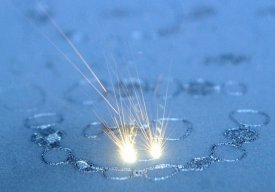Renishaw, the world's largest supplier of in-lab CAD/CAM scanning machines, has opened a new facility that will allow the manufacture of low cost CAD/CAM frameworks using pure, certified medical-grade Cobalt Chrome metal.
The new copings and frameworks will be produced using an advanced rapid manufacturing technology called Direct Metal Laser Sintering (DMLS), and will allow dental laboratories to offer a high quality, lower cost alternative to ceramic restorations, which Renishaw is calling Laser PFM.
 Laser PFM dental frameworks being manufactured.
Laser PFM dental frameworks being manufactured.
Dental frameworks from a certified source
Speaking about the new facility, Bryan Austin, Director of Renishaw's Dental Products Division said, "Renishaw's aim is to constantly push the boundaries of science and technology in the sectors in which we operate. The DMLS process is much cleaner and more efficient than traditional investment ('lost wax') casting techniques used for many years to produce metal frameworks, and we believe that our new service will appeal to laboratories who would like to remove a messy process and free up space. With so much concern about imported metal crowns, it will also be reassuring that the new Cobalt Chrome copings and frameworks are from a certified source, and are free from nickel, beryllium and cadmium. All our customers will be welcome to visit the facility."
No inclusions, defects or distortions
The new DMLS process is sometimes described as '3D printing' as it uses a high power laser to fuse together successive thin layers of powdered metal, just 0.02 mm thick. The frameworks are created from powdered Cobalt Chrome and when every layer has been built up, the solid copings and bridge frameworks are then removed from the machine, sand blasted, polished, inspected and ultrasonically cleaned. The DMLS process is precise and computer-controlled, ensuring consistent frameworks with improved marginal fit and no possibility of inclusions, defects or distortions that are commonly introduced in manual casting processes. The machine can create hundreds of units at a time, meaning that cost per unit is kept low.
Official opening
The new facility was officially opened on 9th March by Dr Robert Williams, from the University of Wales Institute in Cardiff, who is a leading expert in dental CAD/CAM rapid manufacture, electronic learning in dental technology, and removable partial denture frameworks. Also present at the opening were senior Directors from Renishaw including John Deer, Deputy Chairman, and Geoff McFarland, Group Engineering Director.